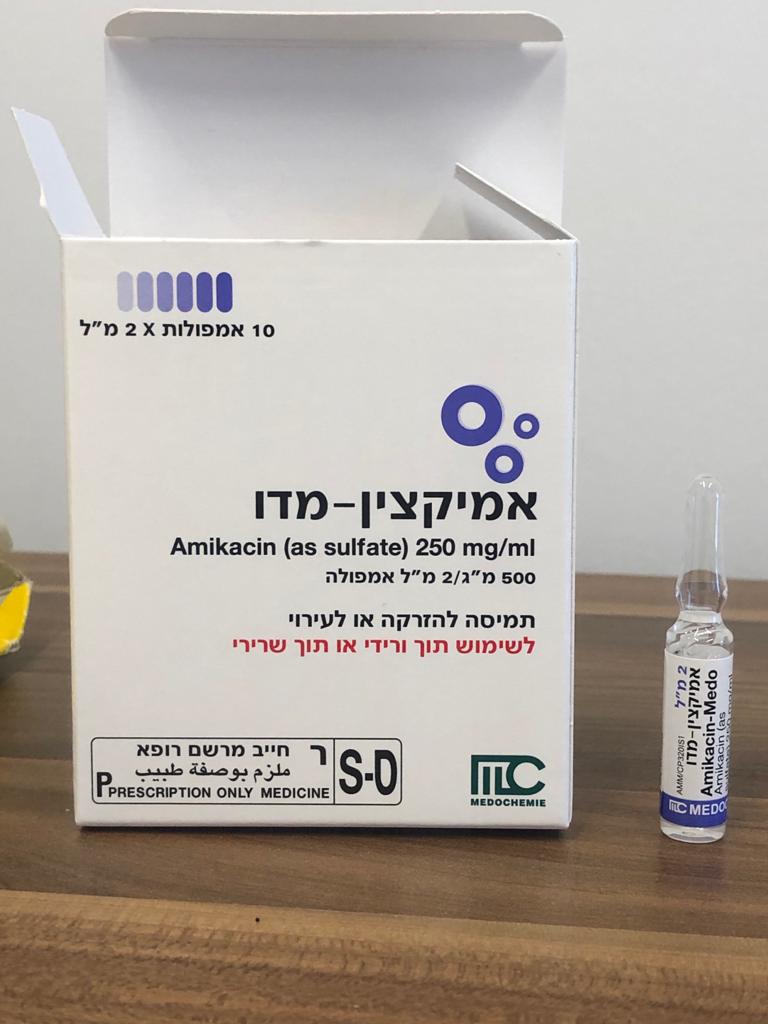Quest for the right Drug

אמיקצין-מדו AMIKACIN - MEDO (AMIKACIN AS SULFATE)
תרופה במרשם
תרופה בסל
נרקוטיקה
ציטוטוקסיקה
צורת מתן:
תוך-שרירי, תוך-ורידי : I.M, I.V
צורת מינון:
תמיסה להזרקהאינפוזיה : SOLUTION FOR INJECTION / INFUSION
עלון לרופא
מינוניםPosology התוויות
Indications תופעות לוואי
Adverse reactions התוויות נגד
Contraindications אינטראקציות
Interactions מינון יתר
Overdose הריון/הנקה
Pregnancy & Lactation אוכלוסיות מיוחדות
Special populations תכונות פרמקולוגיות
Pharmacological properties מידע רוקחי
Pharmaceutical particulars אזהרת שימוש
Special Warning עלון לרופא
Physicians Leaflet
Pharmacological properties : תכונות פרמקולוגיות
Pharmacodynamic Properties
5.1 Pharmacodynamic properties ATC code: J01G B06 Amikacin is a semi-synthetic aminoglycoside antibiotic derived from Kanamycin A. It is active against a broad spectrum of Gram-negative organisms, including pseudomonas, Escherichia coli and some Gram-positive organisms, e.g. Staphylococcus aureus. Aminoglycoside antibiotics are bactericidal in action. Although the exact mechanism of action has not been fully elucidated, the drugs appear to inhibit protein synthesis in susceptible bacteria by irreversibly binding to 30S ribosomal subunits.
Pharmacokinetic Properties
5.2 Pharmacokinetic properties Amikacin is rapidly absorbed after intramuscular injection. Peak plasma concentrations equivalent to about 20 mg/ml are achieved one hour after IM doses of 500 mg, reducing to about 2 µg/ml 10 hours after injections. Twenty per cent or less is bound to serum protein and serum concentrations remain in the bactericidal range for sensitive organisms for 10 to 12 hours. Single doses of 500 mg administered as an intravenous infusion over a period of 30 minutes produce a mean peak serum concentration of 38 µg/ml. Repeated infusions do not produce drug accumulation in adults with normal renal function. However, decreased renal function will lead to accumulation. In adults with normal renal function the plasma elimination half-life of amikacin is usually 2-3 hours. 94 - 98% of a single IM or IV dose of amikacin is excreted unchanged by glomerular filtration within 24 hours. Urine concentrations of amikacin average 563 µg/ml in the first 6 hours following a single 250 mg IM dose and 163 µg/ml over 6-12 hours. Following a single 500 mg IM dose urine concentrations average 832 µg/ml in adults with normal renal function. Amikacin diffuses readily through extracellular fluids and is excreted in the urine unchanged, primarily by glomerular filtration. It has been found in pleural fluid, amniotic fluid and in the peritoneal cavity following parenteral administration. Data from multiple daily dose trials show that spinal fluid levels in normal infants are approximately 10 to 20% of the serum concentrations and may reach 50% in meningitis. Intramuscular and intravenous administration In neonates and particularly in premature babies, the renal elimination of amikacin is reduced. In a single study in newborns (1-6 days of post-natal age) grouped according to birth weights (<2000, 2000-3000 and >3000g). Amikacin was administered intramuscularly and/or intravenously at a dose of 7.5 mg/kg. Clearance in neonates >3000 g was 0.84 ml/min/kg and terminal half-life was about 7 hours. In this group, the initial volume of distribution and volume of distribution at steady state was 0.3 ml/kg and 0.5 mg/kg, respectively. In the groups with lower birth weight clearance/kg was lower and half-life longer. Repeated dosing every 12 hours in all the above groups did not demonstrate accumulation after 5 days.

שימוש לפי פנקס קופ''ח כללית 1994
לא צוין
תאריך הכללה מקורי בסל
לא צוין
הגבלות
לא צוין
מידע נוסף
